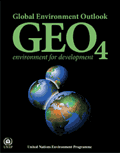
Major environmental challenges—including land degradation and desertification, pollution, and climate change—demand swift, concerted global action, say the authors of
Global Environmental Outlook: Environment for Development (
GEO-4), which was recently published by the UN Environment Programme (UNEP). Assessing the state of the Earth’s atmosphere, land, water, and biodiversity, the 572-page report finds that as the global population grows and consumes increasing amounts of natural resources, it threatens the health of essential ecological assets ranging from fish stocks to fertile land to freshwater.
GEO-4 identifies the most pressing environmental issues confronting each region of the world, and offers policymakers specific recommendations for responding to these challenges.
For the first time, the assessment includes explicit analysis of the linkages between the environment and conflict. ECSP Director Geoff Dabelko served as one of the lead authors of Chapter 7, “Vulnerability of People and the Environment: Challenges and Opportunities,” which explores the relationship between environmental change and security using the concept of human vulnerability. The authors emphasize that the poor are the most susceptible to the stresses caused by degraded environments, and suffer disproportionately from land degradation, water contamination and scarcity, and increasingly frequent and severe natural disasters.
“A combination of environmental change, resource capture and population growth decreases the per capita availability of natural resources, and can threaten well-being for large segments of societies, particularly the poorest who depend on these natural resources for survival. The resulting social effects—migration, intensified unsustainable behavior and social sub-grouping—strain the state’s ability to meet its citizens’ demands, and can contribute to violent outcomes,” write the authors. They recommend reducing people’s vulnerability to environmental and socio-economic changes by bolstering the resource rights of local people; promoting sustainable livelihoods; improving communities’ natural disaster coping capabilities; and empowering women and other historically disadvantaged groups. They also urge the integration of environmental considerations into broader development activities, so that development will be sustainable and will help, not harm, a country’s poorest members.
UNEP has spearheaded a range of efforts analyzing environment, conflict, and security connections. Its Post-Conflict and Disaster Management Branch (PCDMB) conducts scientific assessments of environmental conditions in conflict and post-conflict settings. The Woodrow Wilson Center recently hosted the U.S. launch of PCDMB’s June 2007 Sudan Post-Conflict Environmental Assessment. In 2003, UNEP’s Division of Early Warning and Assessment (DEWA) took a broader look at the links between environment and conflict with the publication of Understanding Environment, Conflict, and Cooperation.
 Major environmental challenges—including land degradation and desertification, pollution, and climate change—demand swift, concerted global action, say the authors of Global Environmental Outlook: Environment for Development (GEO-4), which was recently published by the UN Environment Programme (UNEP). Assessing the state of the Earth’s atmosphere, land, water, and biodiversity, the 572-page report finds that as the global population grows and consumes increasing amounts of natural resources, it threatens the health of essential ecological assets ranging from fish stocks to fertile land to freshwater. GEO-4 identifies the most pressing environmental issues confronting each region of the world, and offers policymakers specific recommendations for responding to these challenges.
Major environmental challenges—including land degradation and desertification, pollution, and climate change—demand swift, concerted global action, say the authors of Global Environmental Outlook: Environment for Development (GEO-4), which was recently published by the UN Environment Programme (UNEP). Assessing the state of the Earth’s atmosphere, land, water, and biodiversity, the 572-page report finds that as the global population grows and consumes increasing amounts of natural resources, it threatens the health of essential ecological assets ranging from fish stocks to fertile land to freshwater. GEO-4 identifies the most pressing environmental issues confronting each region of the world, and offers policymakers specific recommendations for responding to these challenges. A Publication of the Stimson Center.
A Publication of the Stimson Center.

 Major environmental challenges—including land degradation and desertification, pollution, and climate change—demand swift, concerted global action, say the authors of
Major environmental challenges—including land degradation and desertification, pollution, and climate change—demand swift, concerted global action, say the authors of 




